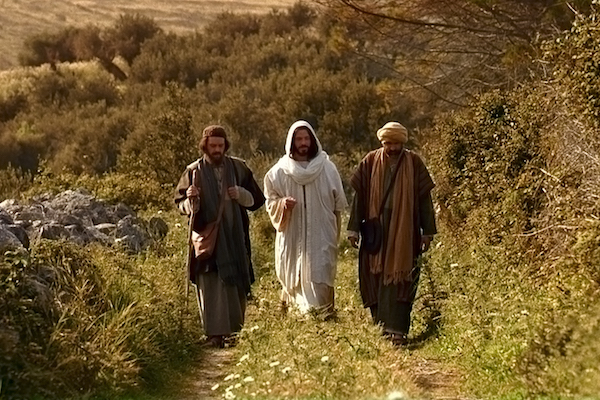RESURRECTION WEDNESDAY 2024 - LIFE OF CHRIST

RESURRECTION WEDNESDAY 2024 - Wednesday April 3
“On that same Easter Sunday, Our Blessed Lord made another appearance to two of His disciples who were on their way to a village named Emmaus, which was a short distance from Jerusalem. It was not so long ago that their hopes had been burning brightly, but the darkness of Good Friday and the burial in the tomb caused them to lose their gladness. No subject was more in men’s minds that particular day than the Person of Christ. As they were discoursing with sad and anxious hearts on the awful incidents of the last two days, a Stranger drew near to them. Their eyes, however, were held fast so that they did not recognize that it was the Risen Savior; they thought Him to be an ordinary traveler. As the story unfolded, it became clear that what blinded their eyes was their unbelief; had they been expecting to see Him, they might have recognized Him. Because they were interested in Him, He vouchsafed His Presence; because they doubted His Resurrection, He concealed the joy and knowledge of His Presence. Now that His Body was glorified, what men saw of Him depended on His willingness to reveal Himself and also on the disposition of their own hearts. Though they did not know Our Lord, they nevertheless were ready to enter into discussion with the Stranger concerning Him.
After listening to their long discussion, the Stranger asked: “What talk is this you exchange between you as you go along, sad-faced?” (Luke 24:17) Obviously, the reason these disciples were sad was because of their bereavement. They had been with Jesus; they had seen Him arrested, insulted, crucified, dead, and buried.
The Savior with His infinite wisdom did not begin by saying, “I know why you are sad.” His technique was rather to draw them out; a sorrowful heart is best consoled when it relieves itself. If their sorrow would have a tongue and speak He would have an ear and reveal. If they would but show their wounds, He would pour in the oil of His healing.
One of the two, whose name was Cleophas, was the first to speak. He expressed amazement at the ignorance of the Stranger Who was apparently so unfamiliar with the events of the last few days. “What, art thou the only pilgrim in Jerusalem who has not heard of what has happened there in the last few days?” (Luke 24:18) The risen Lord asked: “What happenings?” (Luke 24:19)… As with the woman at the well, he asked a question, not to get information, but to deepen knowledge of himself. Then not Cleophas alone but also his companion told Him what had happened. They spoke:
“About Jesus of Nazareth, a prophet whose words and acts had power with God, and with all the people; how the chief priests, and our rulers, handed Him over to be sentenced to death, and so crucified Him. For ourselves, we had hoped that it was he who was to deliver Israel; but now, to crown it all, today is the third day since it befell. Some women, indeed, who belonged to our company, alarmed us; they had been at the tomb early in the morning and could not find His Body; whereupon they came back and told us that they had seen a vision of angels, who said that he was alive. Some of those who were with us went to the tomb, and found that all was a s the women had said, but of Him they saw nothing.” (Luke 24:19-24)
These men had hoped great things, but God, they said, had disappointed them. Man draws a blueprint and hopes that God in some way will rubberstamp it; disappointment is often due to the triviality of human hopes. Original drawings now had to be torn up – not because they were too great, but because in the eyes of God they were too little… They thought that they had found the Redeemer before He was crucified, but actually they had discovered a Redeemer crucified. They had hoped for a Savior of Israel, but were not expecting a Savior of the Gentiles as well. They must have heard Him say on many occasions that He would be crucified and rise again, but they could not fit catastrophe into their idea of a Master. They could believe in Him as a Teacher, as a political Messias, as an ethical reformer, as a savior of the country, a deliverer from the Romans, but they could not believe in the foolishness of the Cross.
There seemed to be a double purpose in the appearance of Our Savior after His Resurrection, one to show that He Who died had risen; the other, that though He had the same Body, it was now glorified and not subject to physical restrictions. Later on, He would eat with His disciples to prove the first; now, as with the Magdalen whom He forbade to touch Him, he stressed His risen state.
With these disciples as with all of the Apostles, there was no predisposition to accept the Resurrection. The evidence for it had to make its way against doubt and the most obstinate refusals of human nature.
Then the risen Savior said to them: “Too slow of wit, too dull of heart, to believe all those sayings of the prophets! Was it not to be expected that the Christ should undergo these sufferings, and enter so into His glory?” (Luke 24:25-26) They are accused of being foolish and slow of heart... Credulity toward men and incredulity toward God is the mark of dull hearts.”
(Chapter 54, pgs. 868 – 874)
+ QUOTES FOR LIFE